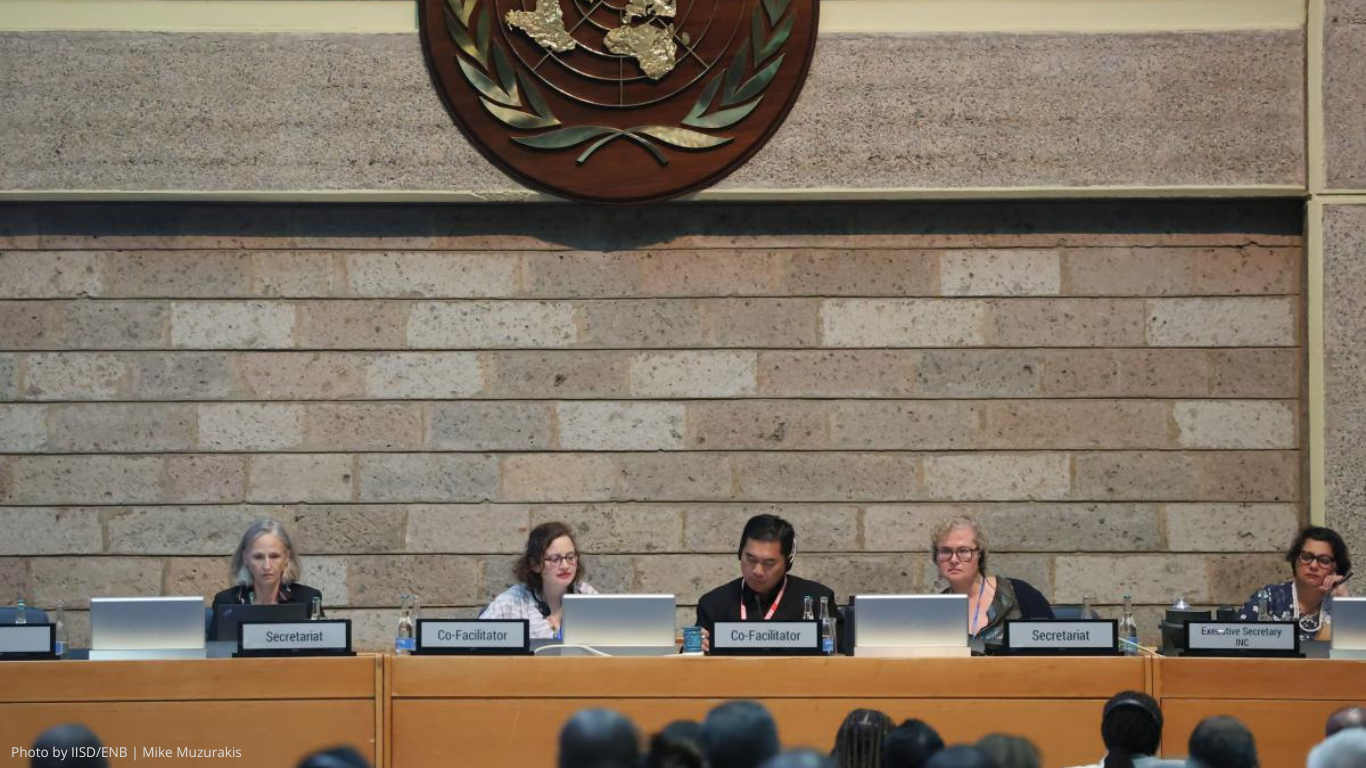Global Plastics Treaty is taking a next step in its development

13 November 2023, Nairobi (Kenya) - Coalition Clean Baltic along with many other global and national environmental NGOs is joining UN governments for a third session of the Plastics Treaty Intergovernmental Negotiating Committee (INC-3), which is taking place this week in UNEP headquarters in Nairobi, Kenya.
During INC-3 participants will be mainly working with the zero draft of the Plastics Treaty, which was released by UNEP and the INC Chair in September 2023. The released document includes many placeholders and different language options, which are a good basis for further discussions. The most promising areas presented in the draft include options for progressive reduction of plastic production, elimination of polymers and chemicals of concern, elimination of problematic short-lived and avoidable plastics, the recognition of the need for transparency, just transition, and the setting up of systems and targets for reduction and reuse, among others. Potentially problematic and ambiguous provisions include text on recycled plastic content, Extended Producer Responsibility, and waste management. Without ambitious standards, these areas could misplace the emphasis on recycling and waste management measures, undermining the treaty's effectiveness.
“CCB believes that plastic pollution is currently a growing international crisis with a devastating impact on the environment, including on the marine resources, human health, human rights, environmental justice, the rights of indigenous people, biodiversity, and climate. As numerous studies have demonstrated, plastic has been found everywhere, not only in ecosystems and the atmosphere but also in the food we eat, the water we drink, and even inside our bodies”, comments Eugeniy Lobanov, CCB Hazardous Substances and Marine Litter Working Area Leader, and participant of INC 3 in Nairobi. He continues: “The future Global Plastics Treaty shall be effective in reversing the tide of plastic pollution, mechanisms and solutions to address it need to exist within climate and planetary boundaries. Among other things the new Treaty should be centered on avoiding future plastic pollution throughout the life cycle by phasing down production and consumption of plastics, and prohibition of toxic chemicals in plastics.”

CCB would also like to highlight that the evidence of toxic threats from chemicals in plastics has been accumulating, with recent evidence showing the complexity of the toxic plastic problem. Data published in the beginning of November 2023 reveal that hundreds of chemicals, including numerous highly toxic pesticides, were found in recycled plastic material (pellets) collected from thirteen countries across Africa, South America, Asia and Europe. In correspondence also published in November 2023 in the prestigious journal Science, researchers from IPEN, the University of Gothenburg, Aarhus University, and the University of Exeter noted that “Hazardous chemicals present risks to recycling workers and consumers, as well as to the wider society and environment… Before recycling can contribute to tackling the plastics pollution crisis, the plastics industry must limit hazardous chemicals.” A webinar previewing a forthcoming study from the Norwegian University of Science and Technology noted that there are more than 16,000 chemicals used in plastics with 25% classified as hazardous and noted that “no plastic chemical [can be] classified as safe.”
“Plastic recycling has been touted as a solution to the plastics pollution crisis, but toxic chemicals in plastics complicate their reuse and disposal and hinder plastic recycling,” said Dr. Bethanie Carney Almroth, of the University of Gothenburg in Göteborg, Sweden and a co-author of a recent study showing that plastic and chemical pollution has exceeded the Earth’s “planetary boundaries.” Dr. Almroth continued, “Numerous studies show that hazardous chemicals can accumulate even in relatively close-loop plastic recycling systems. We need to rapidly phase-out plastic chemicals that can cause harm to human health and the environment.”
***
Article written by Eugeniy Lobanov, CCB Hazardous Substances Working Area Leader
Resources:
UNEP online resource page for INC-3
Background information:
Plastic pollution is a growing crisis for the environment, human health, human rights, biodiversity, and the climate — actions to address it are needed now at the global level.
In March 2022, the United Nations Environment Assembly (UNEA) adopted resolution 5/14 titled “End Plastic Pollution: Towards an International Legally Binding Instrument” that began the process to negotiate a new global plastics treaty by the end of 2024. Following UNEA-5.2, an ad hoc open-ended working group (OEWG) met in Dakar, Senegal, to prepare for negotiations. That meeting recommended five Intergovernmental Negotiating Committee (INC) meetings over the following two years. The first Intergovernmental Negotiating Committee meeting—INC-1—took place 28 November – 2 December, 2022, in Punta del Este, Uruguay. Significant intersessional work has been happening since.
UNEA Resolution 5/14 was a landmark moment in global policy making. Global treaties are the world’s best hope at regulating transnational environmental problems, as we saw in the successful regulation of ozone depleting substances by the Montreal Protocol. Negotiations between UN governments will now focus on interpreting that mandate and developing the treaty. Significant questions about the treaty’s objective, scope, function and form remain.
At the INC-1, civil society groups joined forces to demand a strong and effective treaty, one which fully meets the challenges of the plastics crisis. INC-1 ended with a mix of highs and lows as civil society and rights-holders called for a full life cycle approach, addressing the extraction of feedstocks and production to transport, use, disposal, and remediation.
The INC-2 took place at the UNESCO Headquarters, in Paris, France from 29 May to 2 June, 2023. INC-2 considered multiple elements that could be included in the future treaty. Delegates also elected remaining members of the INC bureau and agreed on the provisional application of the draft rules of procedure. In the end, delegates agreed to mandate the Secretariat to prepare a Committee-driven zero draft, to reflect differing views on elements related to the plastic lifecycle, such as identifying options on definitions and criteria along the plastic supply chain, including on problematic and avoidable plastic polymers and products, design for circularity, substitutes and alternatives, releases and emissions, and addressing means of implementation.
The INC-3 is scheduled to take place from 13 to 19 November 2023 at the UN Environment Programme (UNEP) Headquarters in Nairobi, Kenya. The session will be preceded by regional consultations on 12 November 2023. Also, as decided by the Committee at its second session, a preparatory one-day meeting will take place on 11 November 2023 at the same venue.


